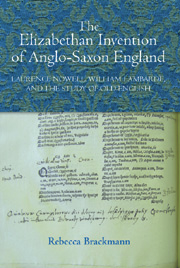 The Elizabethan Invention of Anglo-Saxon England
The Elizabethan Invention of Anglo-Saxon England from PART III - OLD ENGLISH AND THE COMMON LAW
Published online by Cambridge University Press: 05 February 2013
The study of law has always been, to some extent, the study of the past, as the philosophy of legal precedent makes clear: any case or decision can be ‘an example or authority for an identical or similar case afterwards arising for a similar question of law.’ Any legal action could affect later actions, and early modern lawyers and judges needed to know the previous decisions to understand the legal processes of their own day. They also needed to know exactly what the law said; as John Considine observes in his study of dictionaries, legal needs drove much of early modern lexicography, for lawyers ‘needed to understand the wording of the laws and their cultural background.’ Both linguistic and cultural history had to be excavated to understand the law, and Nowell and Lambarde worked extensively on both. The Abcedarium's flyleaf contains a legal glossary of Old English words with Latin equivalents, probably copied from London, British Library Cotton Titus A.xxvii and drawn from the twelfth-century Quadripartitus, a Latin translation of Old English law codes. Nowell also transcribed and collated the Anglo-Saxon laws that he found in manuscripts such as London, British Library Cotton Otho B.xi and Cambridge, Corpus Christi College 383. His work with the laws led to completed (or near-completed) products in the editions and facing-page translations of the Laws of Alfred and Ine. These codices, manuscript showpieces written on membrane, decorated with colored initials and written in Nowell's best hands, both ‘insular minuscule’ and italic, are by far the most ‘finished’ products Nowell produced.
To save this book to your Kindle, first ensure no-reply@cambridge.org is added to your Approved Personal Document E-mail List under your Personal Document Settings on the Manage Your Content and Devices page of your Amazon account. Then enter the ‘name’ part of your Kindle email address below. Find out more about saving to your Kindle.
Note you can select to save to either the @free.kindle.com or @kindle.com variations. ‘@free.kindle.com’ emails are free but can only be saved to your device when it is connected to wi-fi. ‘@kindle.com’ emails can be delivered even when you are not connected to wi-fi, but note that service fees apply.
Find out more about the Kindle Personal Document Service.
To save content items to your account, please confirm that you agree to abide by our usage policies. If this is the first time you use this feature, you will be asked to authorise Cambridge Core to connect with your account. Find out more about saving content to Dropbox.
To save content items to your account, please confirm that you agree to abide by our usage policies. If this is the first time you use this feature, you will be asked to authorise Cambridge Core to connect with your account. Find out more about saving content to Google Drive.